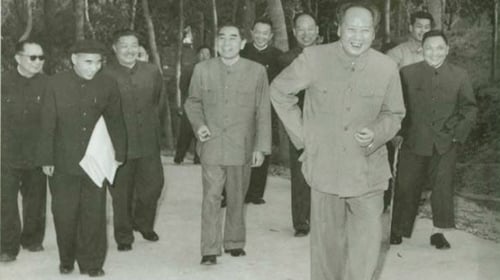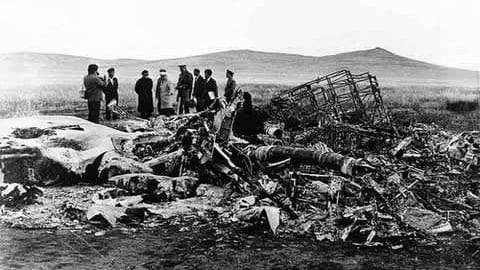
[ad_1]
Chen Yi, Lin Biao, Zhu De, Deng Xiaoping. (Picture source: Internet picture)
Lin Biao, Deng XiaopingHave been included inMao Zedongofsuccessorranks. Lin Biao became the “great deputy helmsman” and Deng became the de facto supreme leader after Mao. So what is the relationship between Deng Xiaoping and Lin Biao?
Among the ten marshals, Deng Xiaoping was the only one who did not associate with Lin Biao.
Deng Rong recalled in “My Father Deng Xiaoping – Years of the Cultural Revolution”: “My father had contacts with nine of the ten marshals, except Lin Biao.” Mao Zedong himself also noticed the antagonism between the two. Deng Xiaoping once said that Mao Zedong called him in 1966 and asked him to meet Lin Biao and work together with Lin Biao. Deng Xiaoping agreed to meet Lin Biao, but the conversation did not resolve the problems between the two men, and instead caused them to go their own ways. According to Deng Xiaoping’s own recollection: “At the beginning of the Cultural Revolution, the chairman came to talk to me and asked me to build a good relationship with Lin Biao. I agreed, but the conversation fell apart after one conversation with Lin Biao.”
In the late 1950s and early 1960s, Mao Zedong regarded Marshal Lin Biao and Deng Xiaoping as his two most promising successors. Zhou Enlai told Wang Jiaxiang in the autumn of 1965 that Chairman Mao was considering two possible successors: Lin Biao and Deng Xiaoping. Mao Zedong selected Lin Biao as his “close comrade” and successor in 1966 to ensure the People’s Liberation Army’s support for him, as Lin Biao had led the army since he replaced Peng Dehuai in 1959. But despite this, Mao Zedong still said privately in 1967 that if Lin Biao’s health failed, he would still let Deng Xiaoping come back.
Deng Xiaoping was one of the leaders highly recommended by Mao at the Seventh Plenary Session of the Seventh Central Committee of the Communist Party of China, and Mao spoke highly of him. Of course, Deng’s leadership of the Secretariat was not only due to Mao’s trust, but also Mao’s way of using him to decentralize power to Liu Shaoqi.
Mao’s appreciation for Deng was still revealed even at the Eleventh Plenary Session of the Eighth Central Committee. Moreover, while not overly attacking Deng, he also had the intention of dividing Liu and Deng. Deng was unanimously elected as a member of the Politburo Standing Committee at the 11th Central Committee of the Eighth National Congress, making him the only Standing Committee member with Mao, Lin, and Zhou Enlai to receive unanimous votes at the plenary session. In the initial ranking according to the number of votes, Deng was ranked fourth. At this plenary meeting, except for Xie Fuzhi who criticized Deng during the meeting, no one else, including Mao, said anything wrong with Deng.
According to the memories of Wang Li, one of the main members of the Central Cultural Revolution Group: “On July 16, 1966, Chairman Mao told me that if Lin Biao’s health failed, I still want Deng Xiaoping to come out, at least as a member of the Standing Committee.” (See “Reflections of Wang Li.” “Records” and “My Father Deng Xiaoping – Years of the Cultural Revolution” by Deng Rong) That July 16th was exactly At a tense moment when preparing to focus on criticizing the working group before the Eleventh Plenary Session of the Central Committee of the Communist Party of China, Mao actually spoke so highly of Deng, who was already considered to have made mistakes in dispatching the working group. This can be said to have extraordinary intentions. In particular, Mao said that Deng was “at least a member of the Standing Committee”. It can be seen that he should be a position such as vice chairman of the Central Committee.

Mao Zedong, Zhou Enlai, Lin Biao, Deng Xiaoping (picture source: Internet picture)
Lin Biao attacked Deng Xiaoping
Mao did not make a decision to overthrow Deng at the 11th Plenary Session of the Central Committee of the Communist Party of China. He didn’t even give any harsh criticism. As deputy commander-in-chief, Lin certainly knew what Mao was thinking. However, not long after the Eleventh Plenary Session of the Central Committee of the CPC, Lin Biao personally went into battle at a Central Committee meeting and severely criticized Deng! Lin Biao said: “One is to compete with the Fourth Wilderness for credit. Mao’s selection was due to the Fourth Wilderness, and Deng insisted that it was from the Second Wilderness. The second is that the Seventh Red Army fled before the battle.” According to the memories of the participants, Deng Xiaoping’s accusations against Lin , without the slightest expression, “he looked at the ceiling and smoked”, which shows the contempt for Lin in his heart.
Regarding “Deng Xiaoping’s so-called desertion when he was in the Seventh Red Army”, in fact, Mao later specifically asked his secretary Xu Yefu to find Deng in the middle of the night and ask him about Deng’s report to Shanghai when he was in the Seventh Red Army. Mao also sent a message through Wang Dongxing To Deng, first, be patient and don’t be anxious; second, Liu and Deng can be separated; third, if you have anything to do, you can write to him (Mao Zedong). Moreover, according to the facts that Deng Rong later listed, it was proved that Deng’s desertion did not exist. At least in Mao’s eyes, it could not be linked to any rebellion. This is why Deng was later said by Mao that “he had no rebellion in history.” behavior” means.
However, Lin Biao was not willing to give up. In October 1966, Deng Xiaoping had to yield to pressure and write inspections. However, in May 1967, Mao once again stated that he wanted to protect Deng. Why did Lin Biao act so aggressively and even ignore Mao’s intentions?
Deng and Lin were of the same generation, with similar ages (only three years apart) and similar qualifications. They were both core members of the first-generation leadership group and Mao’s preferred successors. There was a great rapport between them. The subtle relationship of light. Regarding Liu Shaoqi, Lin did not put any more effort into attacking Deng. He even said privately that “Liu Shaoqi was theoretically more thorough than Chairman Mao.” This shows that Lin’s attack on Deng reflects Lin’s great concern for the position of No. 2 and successor.
Deng Xiaoping takes action after Lin Biao’s end

On September 13, 1971, Lin Biao crashed. (Picture source: Internet picture)
Lin Biao suffered spinal nerve injuries during the Anti-Japanese War and became introverted and suspicious from then on. He was well aware of the dangers of getting too close to Mao Zedong and refused to accept it three times before Mao Zedong actually appointed him. Since becoming Mao’s “close comrade-in-arms”, Lin Biao was worried about his relationship with Mao Zedong – and his worries were indeed justified. By 1970, Mao Zedong had already suspected that Lin Biao might have planned to usurp power while he was still alive, and in the late summer of 1971 he began to prepare to solve the Lin Biao problem. He first met with Lin Biao’s key military leaders to ensure their loyalty to him. When Mao Zedong returned to Beijing from Hangzhou by train in early September 1971, the train stopped in Shanghai. Because he was deeply wary of Lin Biao and worried about his personal safety, he did not leave the train. Instead, he asked Wang Hongwen, the former Shanghai rebel leader and deputy director of the Shanghai Revolutionary Committee at the time, and Xu Shiyou, commander of the Nanjing Military Region, to board his train. . When Lin Biao’s son Lin Liguo learned on September 12 that Mao Zedong had returned to Beijing, the Lin family immediately became panicked. Lin Liguo mobilized a flight crew and a plane to carry Lin Biao and his wife, himself and several followers to escape to the Soviet Union overnight. But the plane did not reach its destination. It crashed in Mongolia and no one on board survived.

Deng Xiaoping returned to power in 1973. The picture shows Deng Xiaoping and Ye Jianying receiving foreign guests. (Picture source: Internet picture)
Deng Xiaoping first learned about the crash from his son Deng Pufang, who listened to the news on a shortwave radio. But he waited nearly two months until the news was officially announced before taking action. On November 6, when documents about Lin Biao’s crash reached the county level, Deng Xiaoping, Zhuo Lin and about 80 workers in the factory where they worked were informed that they would spend two hours listening to central documents about Lin Biao’s crimes. Deng Xiaoping was hard of hearing, so he was allowed to sit in the front row and take a document home to read. After Lin Biao’s death, many people believed that Mao Zedong would soon bring Deng Xiaoping back to assume important positions. Deng Xiaoping himself must have thought so. Two days after hearing the official document about Lin Biao, he mustered up the courage to send a letter to Chairman Mao, even though he had been told not to write to Wang Dongxing again. Deng Xiaoping knew very well what kind of letter would most impress Mao Zedong. After requesting that his two youngest sons be arranged to work beside him in Jiangxi, he wrote:
Lin Biao’s (exposure) was very sudden. I was very shocked and indignant at those criminal actions that deserved death. …If it were not for the wise leadership of the Chairman and the Central Committee, early detection, and timely resolution, if their conspiracy succeeded, I don’t know how many people would have died. …I followed the Chairman’s instructions and worked hard to transform myself through labor and study. … I personally have no requirements, I just hope that one day I can do some work for the party, of course some technical work… This will give me the opportunity to make up for the unexpected by working hard.
Although he spoke humbly, Deng Xiaoping knew well that Mao Zedong could not fail to entrust important responsibilities to cadres who were as courageous and adaptable as he was.
Deng didn’t hear back for months, and even after he did, Mao apparently still had not decided whether and when to bring him back, let alone what role he would be given. At this time, Mao Zedong was physically and mentally exhausted. Moreover, his energy was not used on the leadership team after Lin Biao, but was busy preparing for Nixon’s visit to China in February 1972.
In 1973, with the joint promotion of Ye Jianying and Zhou Enlai, Deng Xiaoping came back.
Source: Look at China
Short URL:
All rights reserved. Reprinting in any form requires permission from this site.It is strictly prohibited to create mirror websites.
[Honorary Members Wanted]Streams can merge into the sea, and small kindnesses can achieve great love. We sincerely recruit 10,000 honorary members from Chinese people all over the world: each honorary member only needs to pay a subscription fee per year and become an honorary member of the “Look at China” website, which can help us break through censorship and blockade and provide services to at least 10,000 mainland Chinese compatriots. Provide independent and true key information to warn them in times of crisis and save them from pandemics and other social crises.



